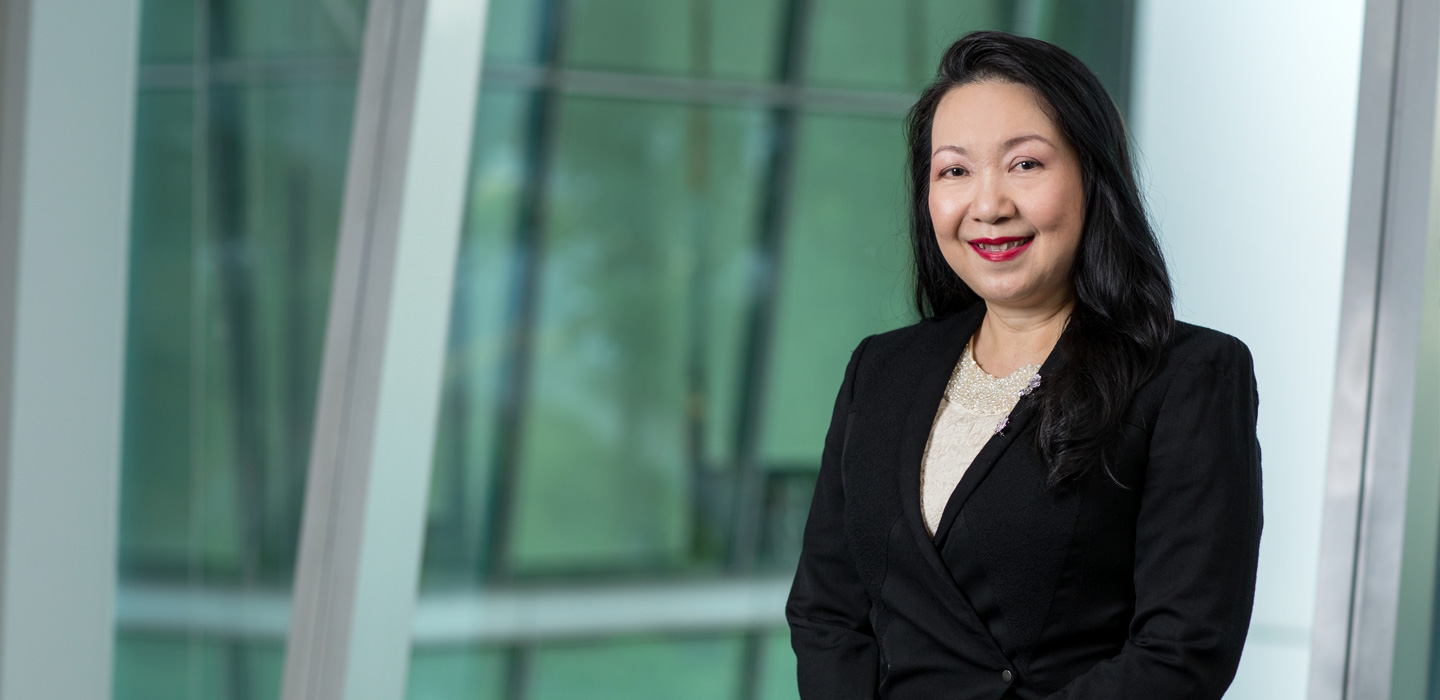When Associate Professor Audrey Chia embarked on a study of how social entrepreneurship can make an impact in healthcare, little did she realise that her paper will start a global conversation.
Collaborating with Associate Professor Lim Yee Wei from the NUS Saw Swee Hock School of Public Health, she co-authored a paper titled “Social Entrepreneurship: Improving Global Health” to underscore the growing role and effectiveness of social entrepreneurship in healthcare delivery. Drawing upon data and case studies of Asian social enterprises, the paper highlights how social enterprises such as Aravind Eye Care System and Kopernik, have risen to the task to meet basic health needs through frugal innovations.
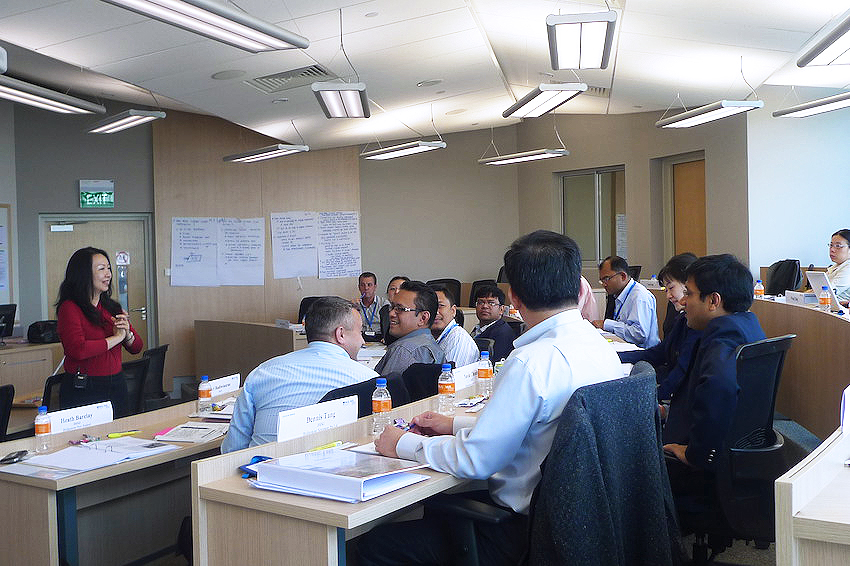
Audrey taking a class at NUS Business School
The Inspiration
Social innovation and healthcare have been key research interests of Audrey. She chaired and presented two sessions on Social Innovation and Entrepreneurship in Health Delivery and Innovative Philanthropy in Health the World Health Summit in 2013. “This gave me an opportunity to meet and learn from few of the leading social entrepreneurs such as Mr Amit Jain of ehealthpoint, Mr Tomohiro Hamakawa and Toshi Nakamura of Kopernik and MrJack Sim of World Toilet Organisation. I realised that some of the most innovative and impactful action in social entrepreneurship is in healthcare sector. Soon after, my collaborator Prof Lim Yee Wei and I considered the possibility of introducing social entrepreneurship to an international medical audience. It was a moon shot but we wanted to try,” shares Audrey.
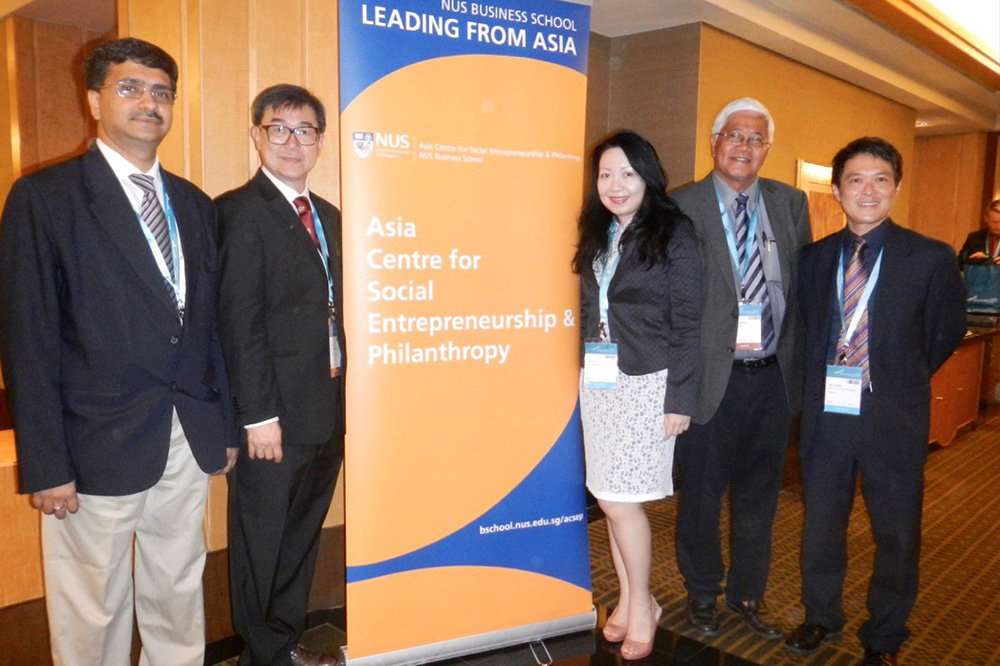
Audrey at the World Health Summit 2013 with (from left) Amit Jain, Founder of ehealthpoint; Jack Sim, Founder of World Toilet Organisation and BoP Hub; Antonio Meloto, Founder of Gawad Kalinga and Prof Yee Wei Lim.
The Impact
The paper has been published by the prestigious Journal of the American Medical Association (JAMA) – the first time any top international medical journal is publishing on social entrepreneurship. JAMA is not only the most credible and high-impact, peer-reviewed medical publication in the world, it is also the most-read.
It has stirred a meaningful dialogue among global agencies, policymakers and communities about how can social enterprises help us meet the Sustainable Development Goals. Acceptance by JAMA signifies a need to recognise social entrepreneurship as a force in improving global health.
“I didn’t know what to expect because I had not published in a top medical journal until JAMA. I was impressed that the editors and reviewers at JAMA were open to our work and published it. It was satisfying because it took social entrepreneurship to a totally different (medical and health) audience. It was like opening a door, or bridging disciplines and communities,” says Audrey.
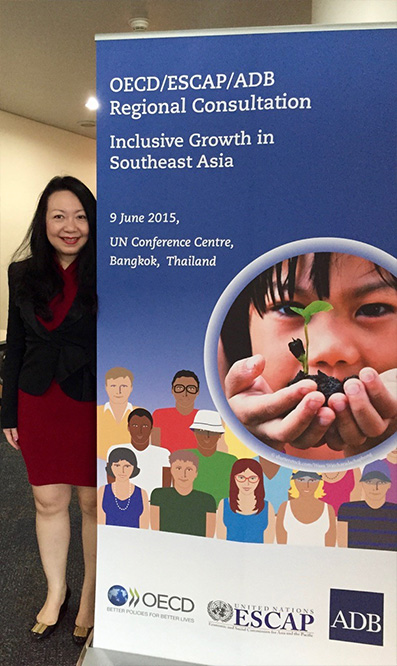
Audrey was an invited Expert at United Nations-OECD-Asian Development Bank consultation on Inclusive Growth
The recognition for her paper has reached beyond an academic publication. Audrey shared her views with in the media and on Asian Development Bank’s (ADB) official blog, both of which have been widely circulated on social media.
“The response to the paper has taken me by surprise. There were hundreds of email, tweets and posts by people across a variety of sectors – medicine, academia, NGOs, social entrepreneurs, philanthropists, private sector. International agencies like United Nations and ADB reacted warmly asking us to write more for them. It was humbling and rather overwhelming,” she shares.
Audrey believes social entrepreneurship makes a valuable contribution to achieving sustainable development.
“Governments and multilateral agencies like ADB and UN should consider training their beneficiaries or communities in the principles and practice of social entrepreneurship. They can encourage it by providing seed money for social ventures and supporting those that have shown a proof of concept and some early successes.”
Audrey’s paper shows how social entrepreneurs can grow and thrive in the right ecosystems. “Agencies should consider creating ecosystems that provide platforms to connect social entrepreneurs, impact investors, venture philanthropists and academics, enabling the exchange of experiences and insights and promote collaboration among the parties. The UN, for example, already has its own Impact Fund, and ADB its inclusive business initiatives. These could be built upon to create platforms or hubs for interaction and growth in the spirit of SDG 17,” she explains.
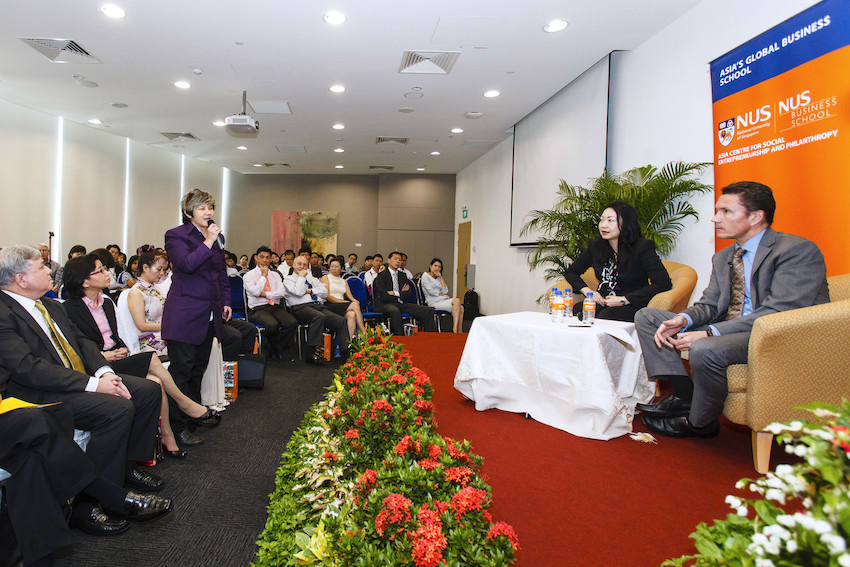
Audrey moderating a panel discussion at NUS Business School
The Learning
The entire experience of embarking on this study has offered Audrey some interesting insights and learnings that she values. “We need to have a healthy disrespect for disciplinary or sectorial boundaries. The more difficult the social problem, the more unlikely we are able to solve it just from the perspective of one discipline or sector. At its best, social entrepreneurship can actually be a multi-pronged tool. A social entrepreneurial solution can tackle several problems at once – health, social and economic,” she adds.
Audrey is also quick to remind that ‘social’ in social entrepreneurship refers to the ‘community’ “The “social’ in social entrepreneurship doesn’t just refer to the primacy of social purpose. It also refers to the participation of the community in developing the solution.”
You can contact Audrey here.



